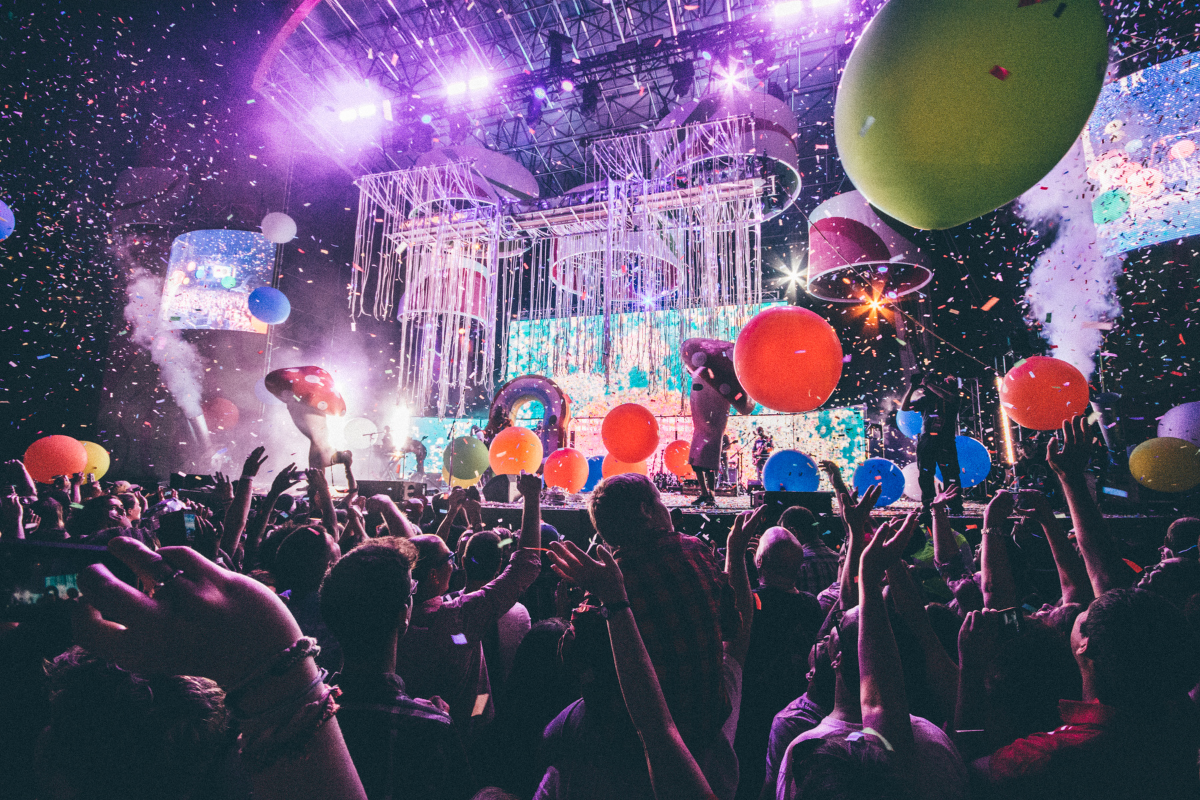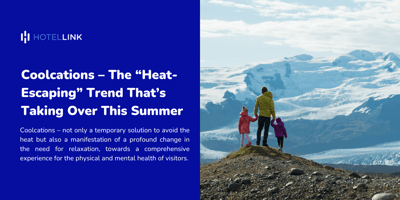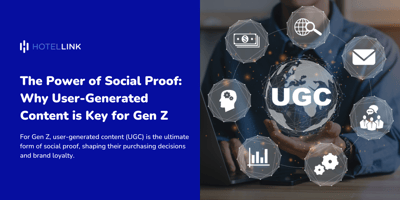As record-breaking heatwaves become the new normal and extreme weather events occur across the...
Concert Travel: The Great Chance for Hotel to Attract Young Generation
In recent years, an increasing number of young people choose "concert ticket hunting" as a reason to board a plane - combining live music with the journey of discovering a new destination. This trend - variously called concert travel, gig tripping, or music tourism - is truly exploding, turning live shows into the highlight of the entire trip. From intercontinental flights to see an idol, to exploring local cuisine and culture after a night of music, the youth are redefining how they travel. In this article, Hotel Link will join you to explore why the young generation is fascinated by this model, its impact on the hotel industry, and how hotels can leverage this trend to attract new guests.
Concert + Travel Trend: What's the Driving Force?
1. The Rise of "Music Tourism"
According to BIME (Music Tourism), the market for music-related travel (concerts, festivals) was valued at approximately $96.78 billion in 2024 and is forecasted to reach ~$267.85 billion by 2030, with a compound annual growth rate of ~18.8%. This impressive figure reflects a major shift in how people spend money on experiences: instead of just buying a show ticket, they are willing to pay for the entire trip.
Many young people don't just go to a concert; they plan a trip that includes lodging, city exploration, and local experiences - meaning they see the concert as the starting point, not the sole destination. A concert in Bangkok can become an opportunity to try famous street food, visit Wat Arun, or shop at Chatuchak. A festival in Seoul is a chance to check in at Namsan Tower, try on Hanbok, and wander through the streets of Hongdae. Music tourism isn't merely about the music - it's about creating a complete journey where music is the catalyst for other memorable experiences.
2. Gen Z & Millennials are Leading the Trend

A survey by AAA & Bread Financial found that: 65% of Gen Z and 58% of Millennials have traveled or plan to travel to an event outside their local area (more than 50 miles from home). These are noteworthy figures, showing that music events have become a valid - even top-priority - reason to travel. This generation doesn't view a concert as ordinary entertainment; they see it as a lived experience worth investing time and money in.
Furthermore, according to Travolution: more than half (51% of Millennials) choose to stay until the encore (the end of the concert), while 39% of Gen Z leave early to avoid traffic congestion. This reflects two different mindsets: Millennials tend to cherish every moment and want the full experience, while Gen Z leans towards practicality and efficiency - they want to optimize their time to enjoy other activities on the trip.
Clearly, the youth are not afraid to spend - 37% of Gen Z and 39% of Millennials have spent between $500 and $5,000 on related events/travel tours. This figure includes not just the concert ticket but also travel, accommodation, dining, shopping, and side activities. For them, this is an investment in memories, content for social media, and building their personal identity through unique experiences.
3. The Concept of "Gig Tripping"
A term that has recently emerged is gig tripping - which means traveling specifically to attend a concert or festival. Many young people use concerts as a reason to discover a new city, experience culture, and create their own travel story. Unlike traditional tourism where you go to see famous landmarks, gig tripping centers on the music event, and everything else is built around serving that experience.
For example, a K-pop fan might book a flight to Jakarta just to see their favorite group's concert but also make time to visit Monas, try street nasi goreng, and shop at Grand Indonesia. Or an EDM enthusiast might go to Ibiza not just for the beaches, but primarily for the Ushuaïa and Pacha festival series. Gig tripping turns music into the "anchor experience" for the entire journey. This is a form of purposeful travel, often high in community spirit (as they usually go with friends or meet other fans), and creates unforgettable memories.
Impact on the Hotel Industry: Opportunities & Challenges
1. Opportunity to Increase Bookings & Ancillary Revenue
Concerts or festivals usually create demand for accommodation, dining, and transportation. Hotels in cities hosting music events stand to benefit greatly - if they know how to seize this opportunity. When a major concert is held, thousands to tens of thousands of people flock to the city for a short period, creating a "wave" of demand for rooms, food and beverage services, spa, and other amenities.
For instance: North Coast Festival (USA) partners with hotels to offer "Hotel + Shuttle + Ticket" packages, helping guests conveniently book an all-inclusive trip without worrying about logistics. Similarly, Lost Lands Festival provides a package including tickets + hotel + shuttle, with the addition of a buffet breakfast and some exclusive merchandise. These combo packages not only increase the occupancy rate but also boost the average booking value, while offering maximum convenience to guests - a key factor for their return in the future.
Beyond room revenue, hotels can also capitalize on ancillary services: a minibar with concert-themed drinks, a relaxing spa package after the show, quick laundry service for those who want a new outfit every day, or even hosting a small after-party at the hotel lounge. Each of these touchpoints is an opportunity to increase revenue and make a positive impression on guests.
2. Demand for Flexible Booking & Peak Management
Concerts often bring "peak night(s)" - nights with a sudden surge in accommodation demand. Hotels need to be prepared not to be overwhelmed or miss out on revenue. Accurately forecasting the number of guests and their booking timing becomes critically important. Otherwise, a hotel might face overbooking (leading to loss of trust) or have vacant rooms when demand is still high (wasting revenue).
A study in Hong Kong using a multi-source event and social media forecasting model showed that music events have a clear impact on inter-city tourist traffic - aiding in forecasting and resource preparation. This model integrates data from ticket sales, Google searches, activity on Twitter/X, and news sources to predict the volume of incoming guests. Thanks to this, hotels can proactively increase staff, stock up supplies, and adjust room prices more flexibly and reasonably.
Additionally, hotels need to be flexible with their cancellation/modification policies. Some guests might want to extend or shorten their stay depending on personal plans, so having a flexible booking policy will be a huge plus in the eyes of concertgoers - who often book last-minute and may change plans at short notice.
3. Specialized Experience Requirements
Concert attendees have higher expectations for amenities: location near the event venue, shuttle service, fast check-in, event-related perks (vouchers, souvenirs, a chill-out space within the hotel). They don't just want a place to sleep; they want an entire experience designed for their music journey.
Hotels must ensure flexibility, good late-night service, and event information support. Many concerts end at 11 PM-12 AM, or even later considering travel time and traffic jams. Therefore, guests might return to the hotel at 1-2 AM, and they expect attentive service: light snacks, drinks, a friendly front desk staff ready to assist, and a quiet space to relax after a night immersed in music.
Some pioneering hotels even establish a "concert concierge" - a specialized consulting department about the concert, helping guests find last-minute tickets, suggesting pre/post-show itineraries, booking transport, etc. These services create a clear distinction and make the hotel an indispensable part of the concert experience.
4. Risk of Room Pricing & Fierce Competition
During event season, many hotels compete to raise prices. Without good management, you might lose loyal customers or engage in a "price war" with competitors. Dynamic pricing is a double-edged sword: it helps maximize revenue when demand is high, but if prices are raised excessively, guests might be outraged, leave negative reviews, or switch to a competitor with a more reasonable price.
Moreover, a sudden price increase can negatively affect brand reputation, especially since social media can spread information rapidly. A post from a dissatisfied customer about being "ripped off" during a concert night can go viral and cause long-term damage. Therefore, hotels need a balanced pricing strategy: increasing prices reasonably based on actual demand, but remaining competitive and not alienating loyal customers.
One solution is to implement "early bird rates" - preferential prices for guests who book early, or special rates for members of the loyalty program. This approach secures early revenue, shows appreciation for regular guests, and creates a fairer feeling compared to uniformly raising prices for everyone.
Hotel Strategy: Catching the Concert Travel Wave
Here are practical suggestions for hotels to capitalize on the concert-cum-travel trend:
1. Design Accommodation + Event Ticket Packages
Partner with concert organizers or ticket agencies to sell a "Stay & Show" package -including room + ticket + shuttle service. This combo package clearly benefits all three parties: the hotel increases bookings, the organizer sells more tickets, and the guest enjoys a convenient, seamless experience.
Offer exclusive benefits: late check-out (or early check-in depending on the guest's schedule), complimentary all-day luggage storage, a pre- & post-concert lounge with free drinks, or even a "goodie bag" with artist or sponsor merchandise. These privileges make the combo package more appealing than booking separately.
Promote this package on your website and social media with appealing visuals and personalized invitations. Use short videos, testimonials from previous guests, or teasers of the concert atmosphere combined with hotel images to build excitement. Don't forget to optimize SEO with keywords like "hotel near [venue name]", "concert accommodation package [artist name]" so searchers can easily find you.
2. Convenient Location & Transportation
If the hotel is near the venue or on a major transit route back, clearly highlight this factor across all marketing channels. "Only a 5-minute walk to [venue]" or "located on the direct bus route from the concert" are powerful messages for concertgoers, who are often tired after the show and want to get back as quickly as possible.
The hotel can provide shuttle services or coordinate transport with the organizer. If the venue is distant, arrange private buses or vans to pick guests up from the hotel to the venue, and, especially importantly, to bring them back after the concert ends. This service is not only convenient but also safe, reducing the worry of finding a taxi or ride-share late at night.
Additionally, the hotel can provide maps, event schedules, and travel times to help guests plan. A compact leaflet or an email can be sent before the guest's arrival with detailed information: venue address, transportation options (private car, bus, train), required time, nearby restaurants for a pre-show meal, and other tourist attractions if they have free time. This thoughtfulness will be highly valued and remembered by guests.
3. "Behind the Scenes" Experience

One experience hotels can implement is concert-themed check-in: artist banners in the lobby, a photo backdrop with the artist's name or event logo (perhaps a small photobooth for guests to check in before the show), and the artist's music playlist in the lobby and common areas. These details create a sense of excitement right upon entering the hotel, making guests feel like they are part of the big event.
Have a partnered merchandise booth, artist-related giveaways (posters, stickers, or even limited edition T-shirts). If permitted by the organizer or artist management company, the hotel can sell or include these items as gifts. This not only increases revenue but also makes the hotel a "must-visit" stop on the fan's concert journey.
Moreover, special show-themed cocktails at the hotel bar will be a memorable experience for fans. For example, if the concert is by a Korean artist, soju cocktails could be served; if it's a UK/US artist, it might be whiskey or gin and tonic with a humorous name related to a song title. These small details create a memorable and "Instagrammable" experience, encouraging guests to share on social media - thus generating natural marketing effects for the hotel.
4. Youth-Oriented Marketing
Utilize UGC (User-Generated Content): encourage guests to post concert + stay photos and videos with the hotel's hashtag, coupled with a reward mechanism or voucher for the best posts. Gen Z and Millennials love sharing experiences on TikTok, Instagram, and Facebook, so leveraging this power will help the hotel reach thousands, even millions of potential people without large advertising costs.
Run ads targeting followers of the artist or event fan pages on Facebook, Instagram Ads, or TikTok Ads. Use targeting tools to only display ads to people who have liked the artist's page or are interested in the specific event. Ad content should be concise, eye-catching, and have a clear CTA like "Book your Concert & Stay package now" or "Only 10 rooms left!"
Email marketing announcing event packages to loyal customers or those who have stayed at the hotel before. Send personalized emails with engaging titles like "Do you remember [Artist Name]? They are coming to [City] on [Date]!" along with a link to the discounted booking. Loyal customers can receive special prices or a free room upgrade, creating a sense of privilege and long-term connection.
See more: The Power of Social Proof: Why User-Generated Content is Key for GenZ?
5. Operational & HR Management
The first concern for hotels is forecasting the number of guests based on ticket sales & event media coverage. Monitor information from the organizer regarding tickets sold, where the audience is expected to come from (domestic or international), and the level of interest on social media. This data helps in more accurate resource preparation.
Increase shifts for front desk, housekeeping, and security staff on the days of the concert and immediately after. Ensure sufficient personnel for quick service, avoiding long waits for guests during check-in/check-out, or rooms not being cleaned on time. Consider hiring part-time staff or shifting personnel from other departments to assist during peak times.
Optimize check-in/check-out for speed, potentially using self-service kiosks, mobile check-in, or express check-out to reduce pressure on the front desk. Concertgoers often want to quickly get to their room to rest or prepare, so any delay can be frustrating.
Hotels need to control quality to prevent errors when serving a large volume of guests. Establish clear checklists for each department, with direct supervisors or managers available to resolve issues immediately. Service quality during peak times will be the deciding factor in whether guests return to your hotel or not.
Case Studies & Evidence
1. 8Wonder Music Festival (Vietnam)
The 8Wonder Festival organized by Vingroup in Vietnam attracted many domestic and international fans, featuring a powerful lineup of international and local singers - from K-pop stars to famous Vietnamese artists. This event took place in locations like Hung Yen, Phu Quoc, Hanoi, Ho Chi Minh City, creating a vibrant, multi-day festival atmosphere.
Hotels in the host cities leveraged this trend: many guests booked early, requesting combo packages for accommodation + tickets + side experiences. High-end hotels like Vinpearl, Sheraton quickly launched special packages, including VIP shuttle service, early check-in, and priority access to lounge areas. Some hotels even partnered with local restaurants to provide dining vouchers or short sightseeing tours before the festival, helping guests fully enjoy the trip.
Thanks to this thorough and flexible preparation, many hotels achieved an occupancy rate of nearly 100% during the days 8Wonder took place, while receiving numerous positive reviews from international guests, helping to enhance their reputation and attract guests in the long term.
2. Lost Lands Festival (USA)
The "Headbanger Hotel Package" at Lost Lands offers tickets + hotel + shuttle, along with breakfast and merchandise, providing festival attendees with a seamless experience. Lost Lands is one of the largest EDM/bass music festivals in the US, attracting tens of thousands of fans annually.
The "Headbanger Hotel" package not only includes comfortable accommodation but also a shuttle service throughout the three-day festival, so guests don't have to worry about driving or finding parking. A buffet breakfast is served daily to fuel guests before a long day of "partying" to the music, and each guest receives an exclusive merchandise bag with a festival T-shirt, stickers, and small accessories.
What's special is that partner hotels also establish a "recovery lounge" - a relaxation area with massage chairs, detox water, and a quiet space for guests to recover after continuous nights of dancing. This model created a comprehensive experience, leading many guests to return every year and be ready to book as soon as the package becomes available.
3. North Coast Festival
Partner hotels offer discounted room rates for guests who purchase festival tickets, along with shuttle service to the festival grounds. The North Coast Festival in Chicago is a three-day music event with multiple genres, from hip-hop and EDM to indie rock, attracting a large number of young people from all over the US.
Hotels participating in the partnership program are listed on the official festival website with a dedicated discount code. Guests simply enter the code when booking to receive a 15-25% discount compared to regular prices. Additionally, hotels arrange shuttles on a fixed schedule: taking guests to the venue in the late afternoon/evening (before the festival starts) and picking them up between 11 PM and 2 AM (after the event ends).
Some hotels also organize a "pre-party" at their rooftop bar on the evening before the festival opens, with a mellow DJ set and discounted cocktails for guests booked under the festival package. This space becomes a meeting point for music fans from various places, fostering community and connection from the start, making the accommodation experience much more memorable than just a place to sleep.
These examples demonstrate that the combination of accommodation – tickets – backstage experience is a practical application trend in the tourism and hotel industry, and it is bringing impressive business results to those who know how to seize the opportunity.
Challenges Hotels Need to Consider
1. Inaccurate Resource Forecasting & Allocation
If the actual number of guests is higher than anticipated, the hotel may be overwhelmed, leading to overbooking, poor service quality, guest complaints, and a damaged reputation. Conversely, lower-than-expected bookings will waste resources - from unnecessarily scheduled extra staff to unutilized reserve food and supplies.
Data is needed from the event organizer, shared information on ticket sales (number of tickets sold, percentage of domestic/international guests, booking trends from previous years if the event is recurring). Some organizers are willing to share detailed audience demographics to help hotel partners prepare better. Additionally, hotels can use data analytics tools from OTAs (Online Travel Agency) and Google Trends to monitor the level of interest and search for the event, thereby adjusting pricing and inventory strategies.
Another method is to establish a "flexible inventory" system - holding back a portion of rooms not opened for early booking, waiting until closer to the event day to assess actual demand before releasing them. This helps prevent rooms from selling out too early when demand remains high, while also optimizing room prices at the last minute when demand spikes.
2. Price Management and Impact on Regular Guests
When raising room prices for an event, regular customers (not attending the concert) might feel affected, especially those booking for business trips or family vacations. They may be disappointed to see prices doubled or even tripled compared to normal days, or find no rooms available even though they are regular guests.
Balance must be maintained or special offers provided for loyal customers. For example, a hotel could implement a "loyalty price lock" - a fixed rate for loyalty program members, unaffected by dynamic pricing during major events. Or reserve a number of rooms with a more reasonable price for early bookers or corporate clients with long-term contracts.
Another way is to clearly tier the offerings: rooms within the concert package might have a higher price (with added amenities), while standard rooms maintain a relatively stable price or only increase slightly. Transparency in pricing policy is also crucial - clearly explaining the reason for the price increase (high demand, increased operating costs, added value from services) so that guests understand and accept, rather than feeling "ripped off."
3. Personnel & Service Quality
On event nights, guests often arrive late (after 11 PM), have high demands (want quick, enthusiastic service even late at night), and may be tired or excited after the concert. If staff are inexperienced or not properly trained in handling situations, service quality is likely to drop.
For example, a new front desk employee might not know how to handle 20-30 guests checking in at 1 AM, or how to deal with overly enthusiastic/noisy guests after "partying" at the concert. Housekeeping staff may be pressured to clean rooms faster than usual to accommodate early arrivals the next day.
Training, specific scenarios, and reserve staffing are important. Before a major event, the hotel should organize a short training session for all staff on:
-
Procedures for handling mass check-ins/check-outs
-
Communication with guests in states of excitement or fatigue
-
Frequently asked questions about the event (venue, schedule, transportation...)
-
Handling complaints and unexpected situations (overbooking, unready rooms...)
In addition, there should be a "backup team" - a reserve staff group that can be called in if the situation exceeds expectations. This thorough preparation not only ensures service quality but also reduces stress for staff, helping them work effectively and make a good impression on guests.
4. Ensuring a Seamless Experience
Hotels need to coordinate well with the organizer to synchronize schedules, transportation, and event informationb - if there is a mistake, the guest experience will be heavily impacted. For instance, if the concert ends later than expected but the hotel's shuttle has already departed, guests will be stranded and highly displeased. Or if the information provided by the hotel about the venue or time is inaccurate, guests might miss the show or arrive at the wrong location.
To avoid these issues, hotels should:
-
Have a direct contact person with the organizer, updating real-time information about the event schedule
-
Use technology (app, SMS, group chat) to notify guests of any changes
-
Have a contingency plan for unexpected situations (extended concert duration, bad weather, traffic congestion...)
-
Gather feedback quickly during and after the event to make timely adjustments
Smooth coordination between the hotel, the organizer, and related services (restaurants, shuttles, tour guides...) will create a seamless experience, making guests feel taken care of from start to finish, and willing to recommend the hotel to friends or return in the future.
Suggestions for Vietnamese Hotels
When international or domestic concerts take place in Hanoi, Ho Chi Minh City, Da Nang, Nha Trang..., hotels can proactively seek information and partner with organizers to launch combo packages. Vietnam is increasingly becoming a destination for major music events - from K-pop concerts (Blackpink, 2NE1, G-Dragon,...) and electronic music festivals (Epizode, Ravolution) to shows by Vietnamese singers (Son Tung M-TP, My Tam, Den Vau).
Furthermore, hotels can implement early marketing - announcing the "Stay & Music" package 2–3 months before the show, or even immediately after the event is officially announced. This early timing allows fans to plan, book flights (if traveling from other provinces), and reserve rooms at a good price. Simultaneously, the hotel has time to run multi-channel marketing campaigns, from Facebook Ads and Google Ads to partnerships with influencers and artist fan pages.
Collaborate with the artist or fan club to offer vouchers or special deals to fans who book early. Many fan clubs have tens of thousands of active members, and an "endorsement" from the fan club will create great credibility. The hotel can sponsor a portion of the costs for the fan club (e.g., giving 10 free rooms to admins and active members), in exchange for promotion on all the fan club's channels. This is a cost-effective and highly trustworthy form of marketing.
Decorate the hall and lobby with a music theme so guests feel the festival atmosphere the moment they walk in. Don't hesitate to invest in beautiful backdrops, colored lighting, and even a mini stage for guests to take photos. Gen Z and Millennials particularly love "Instagrammable" spaces, and if your hotel provides that, you will get hundreds of free posts on Instagram, TikTok, and Facebook - each post being a natural advertisement for the hotel.
Optimize the Booking Engine so guests can easily select the concert package and book rooms quickly. The booking page should have a clear filter for "Concert Package," fully display what is included (tickets, shuttle, breakfast, gifts...), and allow flexible payment (card, e-wallet, bank transfer). The smoother the booking process, the higher the conversion rate will be.
However, among all strategies, dynamic pricing remains the key factor that enables hotels to optimize revenue when demand surges during concert seasons. This is when Yield Management demonstrates its greatest power. By monitoring real-time booking trends, automatically adjusting rates based on demand and competition, managing inventory flexibly on peak nights, and accurately forecasting using OTA and event data, hotels can maximize RevPAR and increase profit per room.
Moreover, Vietnamese hotels can leverage their local culture and cuisine. For example, organize a spring roll or gỏi cuốn (Vietnamese salad) making workshop for international guests on the rest day between concert nights; or arrange food tours at famous night markets and street food stalls. These experiences not only enrich the trip but also create a unique story, making guests want to return to Vietnam - and to your hotel - in the future.
Conclusion
The trend of combining concerts with travel - "gig tripping" - is proving to have a significant ripple effect among today's youth. With a growth rate of nearly 19% annually and a market value projected to reach nearly $268 billion by 2030, this is no longer a fleeting trend but has become an important segment in the global tourism industry.
For the hotel industry, this is an opportunity not just to sell rooms, but to create emotional and memorable experiences and stories for guests. If hotels are flexible in their operations, proactively partner with event organizers, and design smart combo packages, they will become a memorable stopover - where young people want to return and recommend to their friends. In the age of social media, every positive experience shared online is free advertising, helping to reach thousands of potential customers.
So, don't just wait - proactively turn every concert, every festival into an opportunity to affirm your hotel's position in the young generation's music journey. Because ultimately, in the world of experience, the one who creates emotion will win.
See more: Capturing Gen Z Travelers: Unlocking Their Hotel Booking Habits



